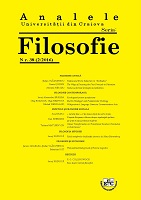PAIDEIA AND EROTIC SEDUCTION IN “ALCIBIADES”
PAIDEIA AND EROTIC SEDUCTION IN “ALCIBIADES”
Author(s): Ștefan VlăduțescuSubject(s): Ancient Philosphy, Hermeneutics
Published by: Editura Universitaria Craiova
Keywords: Platon; paideia; seduction; gnôthi seauton; epimeleia heauton;
Summary/Abstract: The present paper is a philosophematic lecture of the dialogue “Alcibiades” by Plato. The method used represents a combination among the metaanalytical, the comparative and the hermeneutical procedures. Overall, the method is associated with the philosophical hermeneutics. First of all, a relative convergence related to the dialogue comprehension can be noticed after having studied the previous interpretations. Well-known specialists, such as A. Koyré, A. Posescu, V. Muscă, J. Brun, Y. Brès, E. R. Dodds, R. M. Hare and N. Denyer interpret ”Alcibiades” as illustrating the dialogue experience of becoming aware of the imperative according to which the political man should be primarily educated, learned and then rich. Professor Gheorghe Vlăduțescu suggests a different type of comprehension. He considers “Alcibiades” a “dialogue on self-knowledge,” where the interpretation is based on the philosopheme “gnôthi seauton” (“know yourself”). A third paradigm of comprehension is shown by Michel Foucault, who establishes the philosopheme “epimeleia heauton” (“be preoccupied with yourself”) as a framework of interpretation. In relation to these three positions, our article analyzes the dialogue under discussion, according to a synthesizing idea. Our thesis lies on the fact that “Alcibiades” represents a paideic seduction, structured argumentatively on the sophistic recurrence to two philosophemes: “gnôthi seauton” (“know yourself”) and “epimeleia heauton” (“be preoccupied with yourself”). According to the initial remark, Socrates organizes, reshapes erotically Alcibiades’ ambitions to accede to accede to the high-level political power. As a conclusion, the amorous Socrates sets an erotic trap for Alcibiades. Consequently, in the communicational situation developed within the dialogue, we can clearly notice the intricate functioning of both a paideic and erotic situation. The complexity imposed by the process of dialogue decodification originates in the absence of a clear assumption concerning the double relation in progress: apart from the paideic relation, there takes shape, by means of seduction, an erotic relation. By seduction exercised by Socrates, Alcibiades appears both as the object of a paideia and as an erotic object. Paideia (the transformation of cultural acts into life acts) takes place, in the case of Alcibiades, as a pedagogy within a life of spirit: the passage of culture into nonexistence (the paideic instruction) takes place on a seductive, erotic curve.
Journal: ANALELE UNIVERSITĂȚII DIN CRAIOVA. SERIA FILOSOFIE
- Issue Year: 2/2016
- Issue No: 38
- Page Range: 5-23
- Page Count: 19
- Language: English

